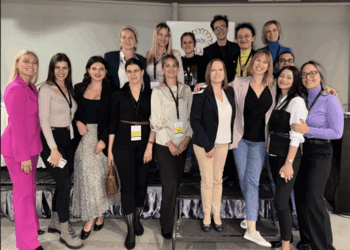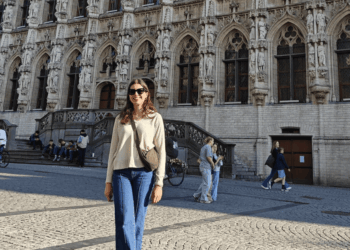Sara Marchisio is a PhD student at the Department of Medical Sciences, University of Turin (UNITO), Italy who received an EACR Travel Fellowship to visit and work at the Department of Dermatology, Leiden University Medical Center (LUMC), the Netherlands between December 2024 and March 2025.
The EACR, with support from Worldwide Cancer Research, provides Travel Fellowships of up to €3,500 to enable early-career cancer researchers to gain new skills through a short-term visit to a lab or research group in another country.
You can read about other Travel Fellows and their experiences here.
 Name: Sara Marchisio
Name: Sara Marchisio
Job title: PhD student
Home institute: Department of Medical Sciences, University of Turin (UNITO), Italy
Host institute: Department of Dermatology, Leiden University Medical Center (LUMC), the Netherlands
Dates of visit: 01 December 2024 – 01 March 2025
Research: Sézary syndrome is a rare and aggressive skin cancer where malignant CD4+ T cells circulate in the blood. Diagnosing and tracking this disease is challenging because no single markers reliably detects tumour cells. Our research focuses on a group of surface proteins (CD39, CD73, CD38) that could behave as markers to help identify cancer cells and monitor patient responses to the treatment. During my visit, I learnt and performed advanced flow cytometry, a technique that allowed me to analyse individual cells from blood samples to study these markers in different patients, aiming to assess their utility in the context of Sézary syndrome.
Why did you choose to apply for an EACR Travel Fellowship?
As a PhD student, the opportunity to work in a different environment is essential for enhancing my project and establishing valuable scientific collaborations that could greatly benefit my future career. I applied for an EACR Travel Fellowship because this grant strongly supports early-career researchers, and for me, it represented a unique opportunity to expand my technical skills and enrich my scientific knowledge.
Why did you choose the host lab?
Sézary Syndrome is a rare tumour, and collaborating with other groups is essential to deepen our understanding of the disease. I chose the research lab at the Department of Dermatology at LUMC because of their long-standing and recognised expertise in studying Sézary Syndrome. In particular, their experience with advanced flow cytometry techniques, which led them to coordinate international projects aimed at developing standardised protocols for identifying tumour cells, made them the ideal host for my research stay.
“Working in an international environment has greatly improved my communication skills, adaptability, and confidence”
What were you able to do that you could not have achieved in your home lab?
During my stay at LUMC, I had access to advanced flow cytometry platforms and analytical tools that are not available in my home lab. This allowed me to perform more complex analyses, improving the quality of my data. Moreover, working next to researchers with deep expertise in Sézary Syndrome provided me with invaluable insights into both technical aspects and biological interpretation of my results. This experience significantly enriched my approach to the project, enhancing the quality of my research.

Did you take part in any interesting local activities?
During my stay in the Netherlands, I fully embraced the local culture. I had the chance to explore several typical Dutch cities, visit museums to immerse myself in the country’s rich history, and enjoy Dutch food and customs. Together with my colleagues, we also planned a day at the biggest theme park in the country. It was undoubtedly one of the most memorable parts of the experience!
How has the trip inspired you in your research?
My stay at LUMC was highly inspiring, both scientifically and personally. Working in a multidisciplinary research environment gave me the opportunity to collaborate with experts in different fields, and to discuss with researchers who approach the disease from different perspectives, often combining clinical and translational point of view. This experience encouraged me to think more critically about my own project, and motivated me to consider new approaches I had not previously explored into my future research.

How has this visit been beneficial to your research and your career?
This visit has been extremely beneficial. On the research side, it allowed me to acquire advanced flow cytometry skills and apply them directly to my project, significantly enhancing the quality of my data analysis. I also gained access to expertise and protocols that would have taken much longer to develop in my home lab.
From a career perspective, this experience strengthened my scientific network and introduced me to leading researchers in the field. Working in an international environment has greatly improved my communication skills, adaptability, and confidence in presenting and discussing my work with experts from different backgrounds. Overall, this visit provided me with valuable tools and connections that will support my growth as a researcher.
Want to find out more?
If you are interested in applying for the Travel Fellowship scheme, please click here for more information: EACR Travel Fellowships.








